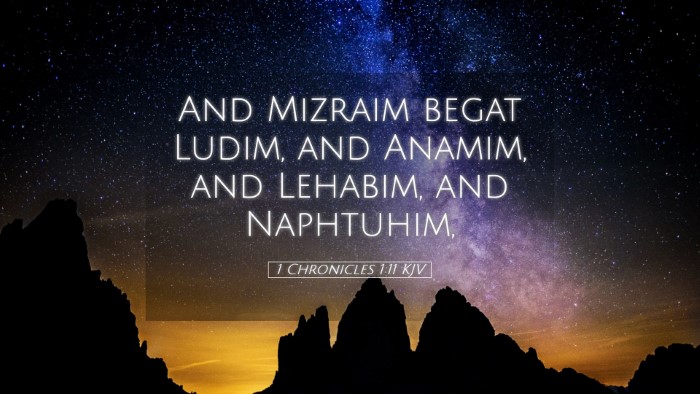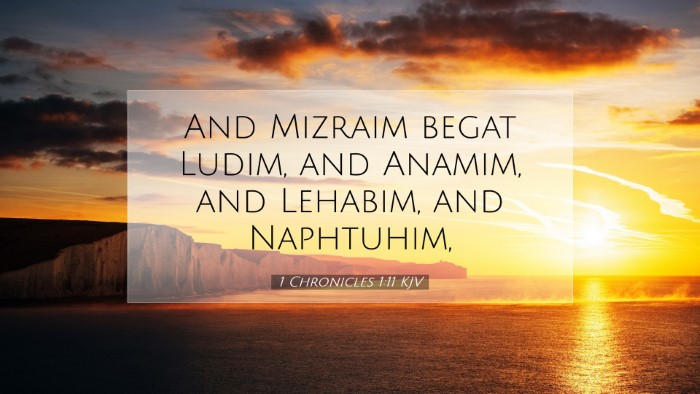Commentary on 1 Chronicles 1:11
Bible Verse: "And Nimrod began to be a mighty one in the earth." (1 Chronicles 1:11, KJV)
Introduction
This verse, which introduces Nimrod as a formidable figure in the ancient world, offers a foundation for understanding his significance in biblical history. Various biblical commentaries provide illuminating insights into Nimrod's character, his exploits, and the implications of his legacy. In this commentary, we weave together the thoughts of renowned scholars such as Matthew Henry, Albert Barnes, and Adam Clarke, enriching our understanding of this pivotal verse.
Contextual Background
1 Chronicles serves as a genealogical record that highlights the lineage from Adam to the post-exilic community. The reference to Nimrod in this context emphasizes the understanding of human civilization's evolution and the interplay of divine sovereignty and human agency.
Nimrod in Historical Context
Nimrod is mentioned in other biblical texts, most notably in Genesis 10:8-12. He is characterized not just as a hunter but as a conqueror and a builder of cities, notably Babylonia and Nineveh, which are emblematic of human ambition opposing divine order.
Commentary from Matthew Henry
Matthew Henry describes Nimrod as "the first in power and also in wickedness," highlighting that his might was not just physical strength but also encompassed political and military prowess. Henry notes that Nimrod's actions often resisted God's will and authority, turning him into a symbol of rebellion against divine governance.
Henry's commentary emphasizes that Nimrod's ability to instill fear and establish dominion over people reflects humanity's propensity to seek power apart from God. This rebellion paves the way for further sinful generations, with Nimrod serving as a prototype for future tyrants.
Insights from Albert Barnes
Albert Barnes provides a linguistic analysis of the term "mighty one," suggesting that it denotes a person of extraordinary strength or power. Barnes explains that the Hebrew term used here ("gibor") implies not only physical might but also a sense of authority and renown among his contemporaries.
Furthermore, Barnes posits that Nimrod's hunting prowess (implied in the lore surrounding him) could symbolize his extraordinary skills and determination, which transcended normal human attributes. This interpretation reinforces the idea that Nimrod's greatness was linked to both his conquests and his ability to inspire fear and loyalty among his followers.
Reflections by Adam Clarke
Adam Clarke provides a rich historical perspective on Nimrod, connecting his actions and reputation with the post-Tower of Babel context. He interprets Nimrod's rise as part of the narrative of humanity's rebellion against God after the flood. Clarke emphasizes that Nimrod’s aspirations to build great cities and societies reflect humanity's hubris.
Clarke also points out that while Nimrod was admired, he embodied the ambition and pride of humanity falling short of divine intention. His legacy thus serves as a cautionary tale for those who pursue power and dominion at the expense of obedience to God.
Theological Implications
As we reflect on 1 Chronicles 1:11, we recognize several critical theological implications:
- The Nature of Power: The text invites us to examine the nature of true power—whether it is derived from God or rooted in human ambition.
- The Consequences of Rebellion: Nimrod's life serves as a reminder of the dangers of opposing God's will, exemplifying how pride can lead to destruction.
- The Sovereignty of God: Despite human endeavors to assert dominance, God's sovereignty ultimately prevails throughout history, reminding believers of a higher order that governs humanity.
Conclusion
In summary, 1 Chronicles 1:11 provides an essential glimpse into the character of Nimrod, a figure emblematic of human ambition and rebellion. The insights gleaned from Matthew Henry, Albert Barnes, and Adam Clarke enrich our understanding of this verse, urging us to contemplate the dynamics between human effort and divine authority.
As pastors, students, theologians, and scholars explore this text, they are called to discern the deeper meanings within the narrative—seeking not just historical detail but also applicable lessons for our modern context. In recognizing both the might and the folly of Nimrod, we are reminded of our call to submission before God, striving for a legacy that honors Him rather than pursuing a fleeting human greatness.


